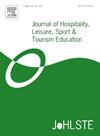当代酒店教育的挑战:教育者的视角
IF 4.1
2区 教育学
Q1 EDUCATION & EDUCATIONAL RESEARCH
Journal of Hospitality Leisure Sport & Tourism Education
Pub Date : 2025-10-18
DOI:10.1016/j.jhlste.2025.100581
引用次数: 0
摘要
这篇文章是无可辩驳的反思。作为酒店教育工作者,我们发现自己陷入了制度要求、行业压力和教学学生的日常现实之间的交叉点,这些学生带着自己的梦想、挫折和怪癖来到这里。根据我们在超过8所大学的共同经验,我们反思了我们共同的旅程,我们努力应对四个顽固的挑战:商学院管理主义令人窒息的崛起、教员工作量的无情膨胀、学术理论与行业相关性之间令人尴尬的拉锯战,以及相当无益的学术势利的持续;这一切都因为学生们的期望变化太快而变得复杂,我们的委员会来不及起草新的模块描述,他们的注意力持续时间比抖音卷还短。这些都不是抽象的烦恼;这些问题会悄悄出现在员工会议上,影响我们的教学实践,在课堂上引发沮丧和幽默。然而,尽管面临挑战,我们仍然抱有希望。在英国和世界其他地方的少数几个“堡垒”中,我们已经看到了毫无疑问与行业相关、包容和经验丰富的课程的例子。我们看到了一些酒店部门的支持和保护。这些口袋提醒我们,酒店教育可以既严谨又真实,尊重学术,同时拥抱酒店所代表的混乱、以人为本的世界。因此,我们呼吁的不是不可能,而是更多的可能:一种更平衡的酒店教育模式,既重视学术声望,也重视职业相关性,这样做可以更好地为我们的学生和我们所服务的行业做好准备。本文章由计算机程序翻译,如有差异,请以英文原文为准。
The contemporary hospitality education challenges: The educators' perspective
This article is unapologetically reflective. As hospitality educators, we find ourselves caught in the crossfire between institutional demands, industry pressures, and the everyday realities of teaching students who arrive with their own dreams, frustrations, and quirks. Drawing from joint experiences in over eight universities we reflect on our shared journey, we grapple with four stubborn challenges: the suffocating rise of managerialism in business schools, the relentless inflation of faculty workloads, the awkward tug-of-war between academic theory and industry relevance, and the rather unhelpful persistence of academic snobbery; all complicated by students whose expectations evolve faster than our committees can draft new module descriptors and their attention span is shorter than a Tik-Tok reel. These are not abstract irritations; they are the things that creep into staff meetings, weigh on our teaching practice, and spark both frustration and humour in our classrooms. Yet, despite the challenges, we remain hopeful. In some very few ‘fortresses’ across the UK and the rest of the world, we have seen examples of curricula that are unapologetically industry-connected, inclusive, and experiential. We have seen some hospitality departments supported and protected. These pockets remind us that hospitality education can be both rigorous and real, respecting scholarship while embracing the messy, people-driven world that hospitality represents. Our call, therefore, is not for the impossible, but for more of the possible: a more balanced model of hospitality education that values vocational relevance as much as academic prestige, and in doing so, better prepares us our students and the sectors we serve for the future.
求助全文
通过发布文献求助,成功后即可免费获取论文全文。
去求助
来源期刊
CiteScore
8.10
自引率
10.80%
发文量
41
审稿时长
42 days
期刊介绍:
The Journal of Hospitality, Leisure, Sport and Tourism Education (JoHLSTE) is the leading international, peer-reviewed educational journal for this subject grouping. Its aims are to: a) Promote, enhance and disseminate research, good practice and innovation in all aspects of higher education in Hospitality, Leisure, Sport and Tourism and Events to its prime audience including teachers, researchers, employers, and policy makers. b) Encourage greater understanding, links and collaboration across its constituent fields. JoHLSTE is designed to have maximum impact through it being available on-line, fully archived and peer-reviewed. JoHLSTE is divided into seven sections: Editorial; Academic Papers; Practice Papers, Perspectives, Comments and Rejoinders, Research Notes and Reports and Education Resource Reviews.

 求助内容:
求助内容: 应助结果提醒方式:
应助结果提醒方式:


